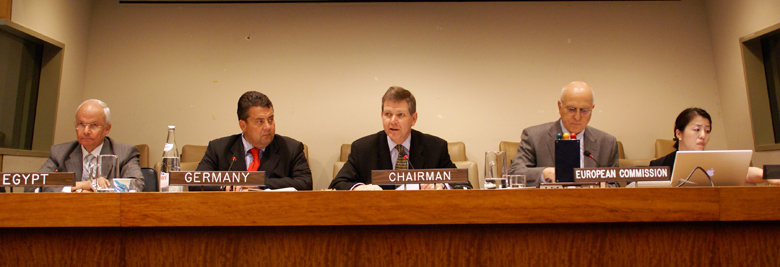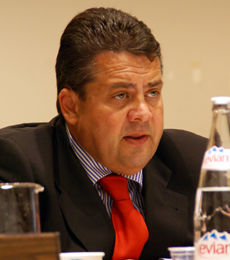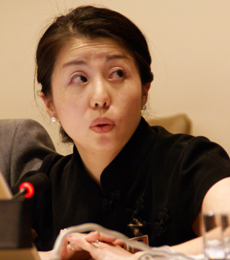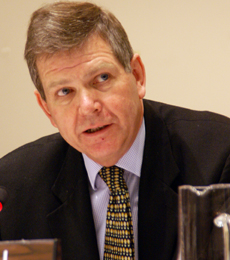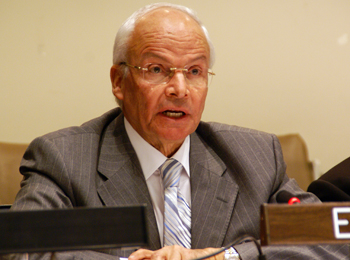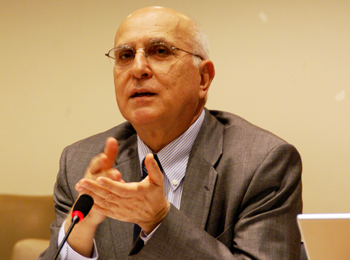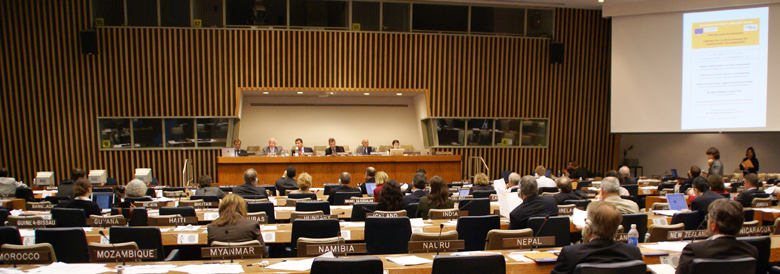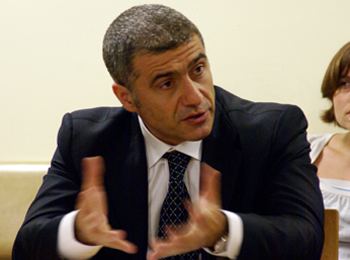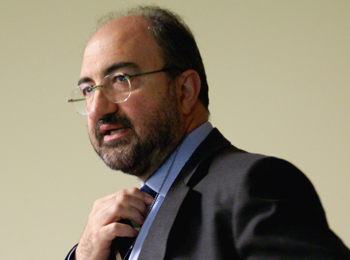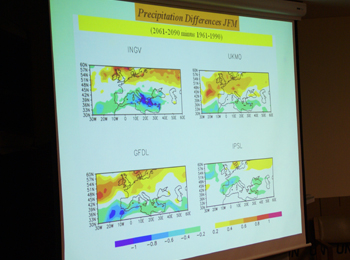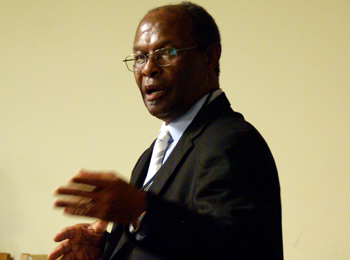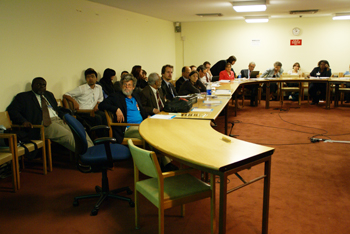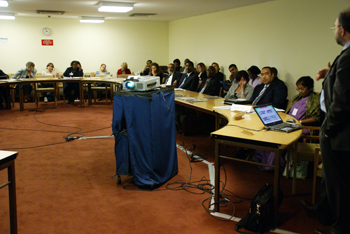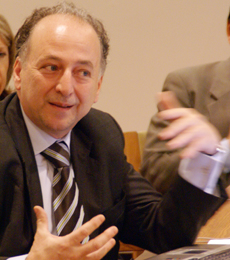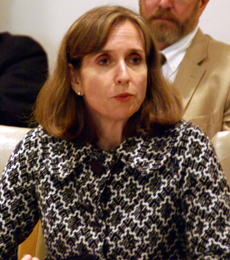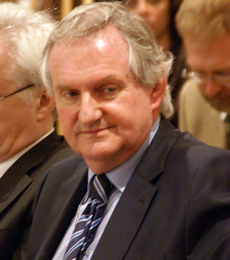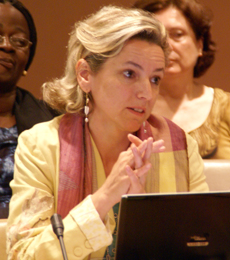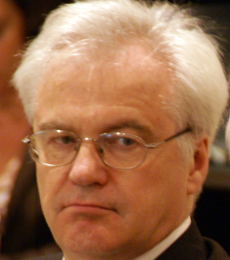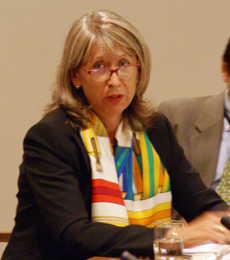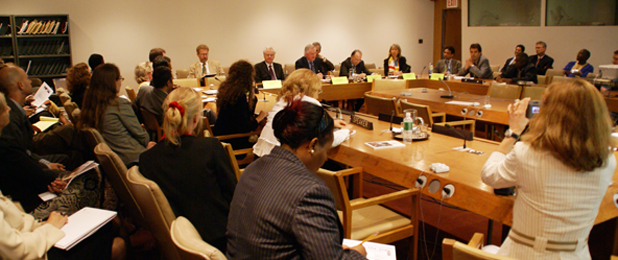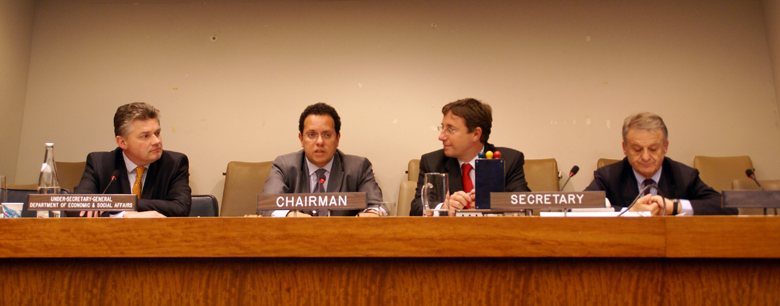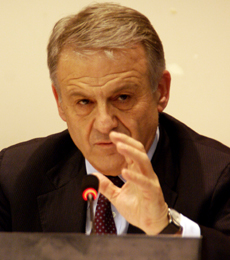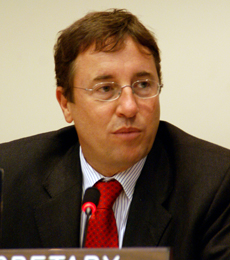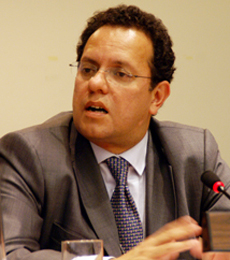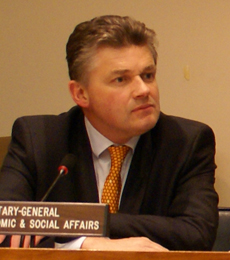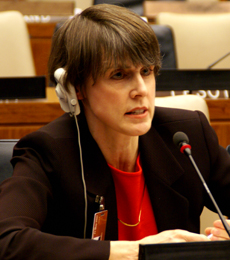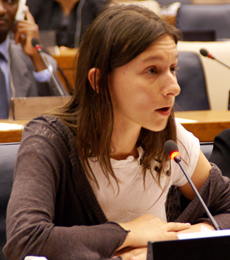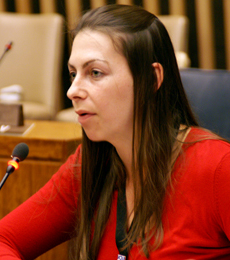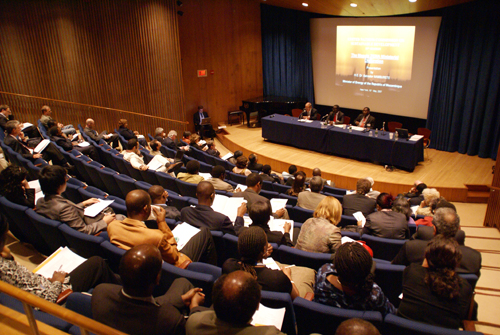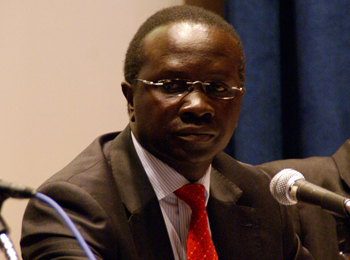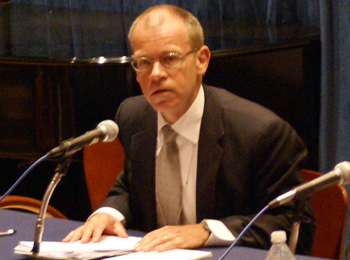 |
||
|
published by IISD, the International Institute for Sustainable Development
in cooperation with the UNDP Secretariat |
|||
|
Special Report on Selected Side Events at the Fifteenth Session of the Commission on Sustainable Development (CSD-15)
|
|||||
| 30 April - 11 May 2007 | United Nations headquarters, New York | |||||
 |
 |
|||
 |
||||
Events convened on Thursday, 10 May 2007
|
||||||||
|
Facilitator Neil Hirst, IEA, opened the side event, calling for strong political action to step up energy efficiency, decarbonize the energy supply, and focus research and development efforts on technologies to eliminate carbon from the transport sector. Sigmar Gabriel, Federal Environment Minister of Germany, said that investment in renewable energy and better energy efficiency pays off, citing Germany’s renewable energy sector, currently worth over 21 billion euro annually and employing 200,000 people. He urged CSD-15 not to simply repeat the agreements from WSSD, but to commit to strong action-oriented outcomes, including targets, which can be the basis of a global regime, not just a European one. Stavros Dimas, EC Commissioner for Environment, unveiled the EU’s package of measures on energy and climate change, including a unilateral commitment to reduce EU emissions by 20%, and by 30% if other developed countries agree to reduce their own emissions by 20%. On international cooperation, he hoped that the EU's carbon trading system could link in with future systems in other developed countries, and announced a global energy efficiency and renewable energy fund for technology transfer, initially focusing on sub-Saharan Africa, currently totaling 120 million euros. Hassan Younes, Minister of Electricity and Energy, Egypt, shared his country's experience in energy and sustainable development, including large grid-connected wind farms in the Red Sea region developed with support from Denmark, Germany, Spain and Japan. He added that Africa has huge potential hydropower resources and good potential sites for wind and thermal-solar power generation. Announcing Egypt’s plan to achieve 20% renewable energy by 2020, he underlined the valuable role of bilateral and regional cooperation between developed and developing countries for renewable energy technology transfer. Mika Ohbayashi, Director of the Institute for Sustainable Energy Policies, Japan, outlined civil society actions to promote renewable energy in her country, including a “Citizens’ Windmill” project under which several large-scale wind turbines have been built, with a significant amount of the total construction cost financed by local people's direct investment. She called for binding renewable energy targets, a concrete CSD review process, and a non-nuclear, non-fossil fuel energy future. Participants discussed subsidies and market distortions, energy savings in the transport sector, CDM’s paucity of projects in small island developing states and sub-Saharan Africa, and the difficulty of preparing CDM projects. |
||||
|
|||
|
Alfonso Pecoraro Scanio, Minister for the Environment, Land and Sea, Italy, said that addressing climate change is an international issue requiring international cooperation. He highlighted an Italian initiative with Pacific Island nations to transfer renewable energy technology, which he hoped to expand to the Caribbean due to its vulnerability to climate change and lack of resources to adequately address adaptation. Scanio also said that Italy is examining ways to reduce carbon emissions produced by energy production, transportation and deforestation.
H. Elizabeth Thompson, Minister of Energy and Environment, Barbados, voiced her gratification for Italy’s continued support and recognition of the extent to which climate change is a problem for the Caribbean, and emphasized that it is now accepted that climate change will not only have environmental impacts, but also economic ones. She underscored the continued need for international recognition of small island developing states’ vulnerability to climate change. Antonio Navarra, Euro-Mediterranean Centre for Climate Change, discussed the Centre’s work, noting that it focuses on climate modeling and data set gathering to study climate variability. He said that the Centre examines predictions of GHG emissions, assesses the economic value of the impacts of climate change and how it affects various sectors, and provides seasonal forecasts. Kenrick Leslie, Caribbean Community Climate Change Centre, explained the Caribbean’s vulnerability to climate change, including its seasonal hurricane activity, and said that sea level rise, higher sea water temperatures, increasingly severe hurricanes and changing rainfall patterns could have severe impacts on the region. Karen Bernard, UNDP, discussed the Caribbean Risk Management Initiative, saying that it is designed to build capacity within the Caribbean region to address the growing occurrence of natural hazards and environmental risks, as well as to emphasize the concept of climate change and social vulnerability through South-South cooperation. Corrado Clini, Director General, Ministry for the Environment, Land and Sea, Italy, suggested a joint work plan for Italy and Belize’s climate centers to examine the similarities and differences in adaptation, prediction and risk management in the Mediterranean and the Caribbean. Participants discussed the need for linkages between the UN International Strategy for Disaster Reduction project and the Caribbean Community, and the need to involve Haiti and Cuba in effective climate risk management. |
|||
|
|||
|
Sarah Adams, Global Village Energy Partnership (GVEP) International, highlighted that in 2006, the GVEP Partnership Board founded GVEP International, and said that the new business plan focuses on providing energy access funds, technical support and capacity building in developing countries to help develop energy supply chains. Moderator Peter Davies, DFID, announced DFID’s 4 million pound programme to support the GVEP's institutional capacity to maximize resources provided by donors, who include the World Bank, UNDP and the Russian Government. Olav Kjørven, UNDP, said that UNDP was one of the founding members of GVEP, highlighted UNDP’s support of GVEP energy projects to provide modern energy services to meet the MDGs in East Africa, and looked forward to continued collaboration within the Partnership. Vitaly Churkin, Permanent Representative of the Russian Federation to the UN, highlighted his country’s US $30 million contribution to GVEP International from 2007-2010 to scale up its work on addressing energy poverty in sub-Saharan Africa. Jamal Saghir, World Bank, said that the Russian Government’s large contribution would help the organization to scale up their activities. He challenged GVEP to play a fundamental role in helping the private sector to deliver off-grid energy and leverage pre-investment support for SMEs. Paula Dobriansky, Under Secretary of State, US State Department, said that the US was also a founding partner of GVEP, and highlighted public-private partnerships as an important tool to help developing countries meet development goals. Jacqueline Coté, World Business Council for Sustainable Development (WBCSD), noted her belief that support to SMEs is critical for building sustainable supply chains. She said that WBCSD is therefore looking at ways to link its associated companies with local energy projects, highlighting that BP is looking into the improved cooking stoves programme. Participants discussed the need for adapting technologies to the local situation, providing affordable off-grid energy access that can generate income in Africa, and supporting institutional capacity. |
|||||
|
|||
|
Ricardo Meléndez-Ortiz, Executive Director of ICTSD, introduced the event by highlighting the need to consider the links between international trade issues and CSD-15 topics, particularly given that many aspects of subsidies, taxes, government procurement, intellectual property and other technical trade-related issues have arisen during CSD-15.
Achim Steiner, Executive Director, UNEP, said that environmental concerns, as exemplified by climate change issues, are beginning to define tomorrow’s market. He suggested that WTO rules may be preventing countries from introducing renewable energy targets, and sought further examination of the issue. Ian Pearson, Minister for Climate Change and the Environment, UK, said that a successful post-2012 climate regime is unlikely without a strong international trade dimension, and called for the trade policy and climate change “communities” to start working together. He suggested that free trade in low- and zero-carbon technologies would provide real opportunities for the developing world to supply sustainable goods and services to the developed world. Corrado Clini, Director General, Ministry for the Environment, Land and Sea, Italy, supported involving the WTO in climate change discussions. On bioenergy, he pointed out that sugarcane-based ethanol is greatly superior to corn-based ethanol for reducing carbon emissions and keeping food prices stable. Following a discussion of international trade and agriculture issues, Steiner concluded that the next round of trade talks would need to have energy at its center. Some panelists suggested that real progress may need to wait until after the conflictive Doha Round, so that a process of rebuilding international trust can commence, and environmental concepts are no longer “bracketed out” of trade discussions. |
|||
|
|
|||
|
Daudi Migereko, FEMA Chair and Minister of Energy and Minerals Development, Salvador Namburete, Minister of Energy, Vijay Iyer, World Bank, stressed the importance of the donor community working together to provide resources and technical capacity for FEMA’s programme of work. Peter Davies, DFID, said that energy is back on the development agenda, and noted that the development community is ready to work with African governments through arrangements such as the EU-Africa energy partnership. Marlis Kees, GTZ, underscored that support for FEMA will become a cornerstone of German-Africa cooperation on sustainable energy. John Christensen, UNEP, highlighted the UNEP Governing Council decision on support to Minoru Takada, UNDP, said that while energy is not specifically identified in the MDGs, UNDP was working to ensure that energy needs are a key component of discussions and plans to meet the MDGs. |
|||
|
|||
|
||
|
Click the above button to go back to our ENB main coverage
|
||
|
|
|
|
|
||
|
